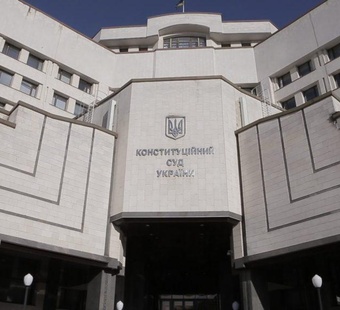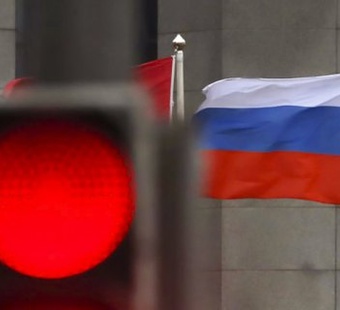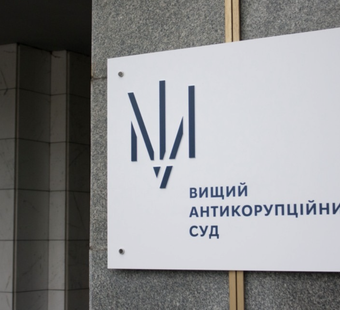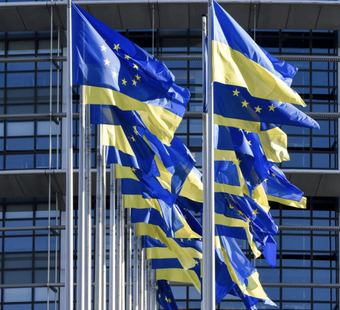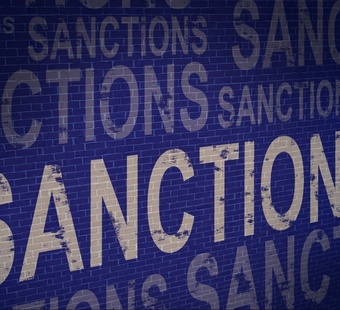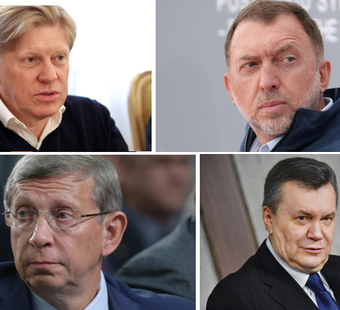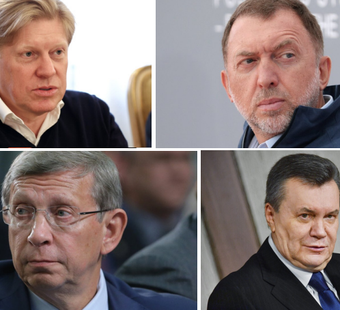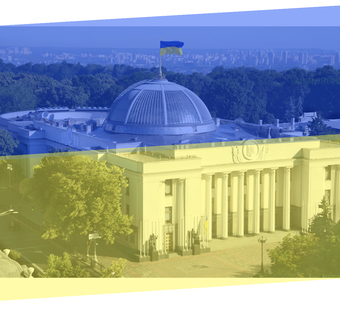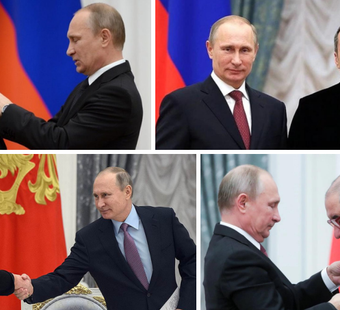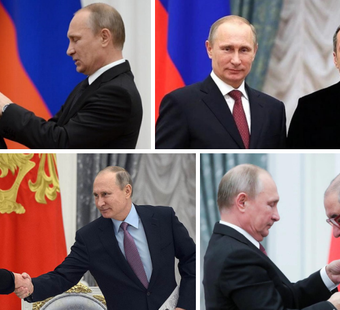>
Analytics>
Standards of trial in absentia and the case law of the HACC concerning collection of sanctioned persons assets into state income (summary)Standards of trial in absentia and the case law of the HACC concerning collection of sanctioned persons assets into state income (summary)


The study addresses the applicability of the standards of trial in absentia (in the absence of the accused) to cases concerning the application of a sanction in the form of asset forfeiture under Article 5-1 of the Law of Ukraine ‘On Sanctions’. The study examines the case-law of the European Court of Human Rights and the European Court of Justice as well as the provisions of the Directive (EU) 2016/343. It is argued that even though the proceedings on the application of the relevant sanction cannot be considered a ‘criminal charge’ for the purposes of Article 6 of the ECHR, the High Anti-Corruption Court (HACC) should take into account the standards of trial in absentia established in the practice of European institutions when considering the relevant cases.
This publication has been made possible through the generous support of the Bureau of Democracy, Human Rights and Labor Affairs of the United States Department of State. The opinions, findings and conclusions stated herein are those of the authors and do not necessarily reflect those of the United States Department of State.
Publisher: think tank “Institute of Legislative Ideas”. All rights reserved.
Authors: Tetiana Khutor, Bohdan Karnaukh, Andrii Klymosyuk, Taras Riabchenko
Introduction

Summary

With the adoption of the Law of Ukraine ‘On Amendments to Certain Legislative Acts of Ukraine on Improving the Efficiency of Sanctions Regarding Assets of Certain Individuals’ (Law No. 2257-IX), a new type of sanction entered the scene in Ukraine, viz the collection into the state income of assets of individuals or legal entities (Article 5-1 of the Law of Ukraine ‘On Sanctions’). It is a special mechanism applicable during martial law which provides for the possibility of confiscation of assets of persons who have created a significant threat to the national security, sovereignty or territorial integrity of Ukraine or significantly contributed to such actions, provided that the relevant assets have been previously blocked by a decision of the National Security and Defense Council (NSDC)(1).
This sanction is enforced through the judicial procedure - by the Ministry of Justice filing a lawsuit with the High Anti-Corruption Court (HACC)(2). And since the sanction involves the irreversible seizure of property (a measure the legitimacy of which is always assessed through the prism of the right to peaceful enjoyment of property(3)), special attention should be paid to compliance with fair trial standards provided for in Article 6 of the European Convention on Human Rights (ECHR).
Section I

The right to be present at the trial and proper notification of the parties in the context of Article 6 of the ECHR

The right to be present during the trial of one's case is an important element of the right to a fair trial under Article 6 of the ECHR. Being present during the trial is a prerequisite for the realization of a broader aspect of the right to a fair trial - the right to be heard, which requires ‘to ensure that a party to the proceedings has the opportunity to present his/her claims and defenses to the court and to present his/her legal case effectively before the court on conditions equal to those provided to the other party, and to receive a reasoned judgment based on the results of the proceedings’(4). Clearly, a party cannot present its case to the court if, for one reason or another, it is deprived of the chance to participate in the trial.
Proper notification of the party about the date, time and place of the trial is, in turn, a component of a fair hearing. In cases where domestic courts do not take sufficient measures to properly notify the parties to a case, the European Court of Human Rights (ECtHR) finds a violation of fair trial standards under Article 6 of the ECHR. In assessing whether the national court has fulfilled its obligation to properly notify the parties to the case, the ECtHR takes into account the following criteria: ‘a) whether the national court has taken all actions in its power to notify the parties properly; b) whether the parties have exercised due diligence in the case in order to be notified properly; c) whether there was a clear and unambiguous waiver of the party's right to have the case tried in judicial hearing; d) whether the court, when deciding to try the case in the absence of a party, has verified the fact of its proper notification’(5).
When analyzing the HACC's jurisprudence, we pointed out the special procedure for notifying defendants in this particular category of cases, as well as the fact that the lion's share of such cases are tried in the absence of the defendant or his representative.
According to parts 1 and 2 of Article 268 Code of Administrative Procedure (CAP)
- In cases specified in Articles 273-277, 280-283-1, 285-289 of this Code, the court shall immediately notify the defendant and other parties to the case of the filing of a statement of claim and the date, time and place of the hearing by sending the text of the summons to the official e-mail address, and in its absence - by courier or by telephone, fax, e-mail or other technical means of communication known to the court.
- 2. A party to the case shall be deemed to have been duly notified of the date, time and place of the hearing specified in part one of this Article from the moment such notice is sent by a court officer, which the latter makes a note of in the case file, and (or) from the moment the court publishes the relevant decision to open proceedings on the web portal of the judiciary of Ukraine specifying the date, time and place of the hearing.
Unlike the general rules (which require sending summonses either to the official e- mail address, if any, or by recommended mail or courier with a return receipt), this article provides for the possibility to notify defendants in this category of cases by telephone, fax or e-mail. Moreover, in the event that even these options are not available, notification may be made through publication on the official web portal of the judiciary of Ukraine.
The assessment of the appropriateness of such notification and the analysis of the Court's jurisprudence on the application of the relevant provision were covered in the previous analytical study of the Institute of Legislative Ideas (ILE).
This time, we will consider the second aspect of the issue, which is pointed out by international experts, namely, whether the practice of trying relevant cases in the absence of the defendant is compatible with international fair trial standards. In other words, whether the HACC complies with the standards of trial in absentia.
(5) Ibid, 89-90.
(6) Official email address is the email address specified by the user in the Electronic Cabinet of the Unified Judiciary Information Telecommunication System.
(7) There are other options as well, but they are conditional on the consent of the party. See: Article 129 CAP.
Section II

Are the standards of trial in absentia applicable to cases concerning the imposition of a sanction in the form of asset forfeiture (collecting assets into state income)?

Within the framework of Article 6 of the ECHR, two limbs are distinguished - criminal and civil. Thus, among the fair trial standards established in the ECtHR case law, some apply only to criminal proceedings, while others are equally applicable to both criminal and civil proceedings. And since the standards of trial in absentia were formulated by the ECtHR primarily for the purposes of criminal proceedings, it has to be answered whether they are applicable to the HACC's jurisprudence in cases concerning the collection of assets into the state income (under Article 5-1 of the Law of Ukraine ‘On Sanctions’). In answering this question, two points should be noted.
First, the concept of ‘criminal charges’ in the context of Article 6 of the ECHR has an autonomous meaning. This means that the ECtHR by its own cognizance determines whether a particular proceeding constitutes a criminal charge, not being bound by how the nature of the relevant proceedings is determined in the domestic legal order where the proceedings took place. Simply put, there may be cases when the ECtHR finds that a certain case constitutes a criminal charge despite the fact that in the jurisdiction where it was tried it is categorized differently (as an administrative, disciplinary or even civil case). Thus, there is a potential possibility that the ECtHR may find that proceedings on asset forfeiture under Article 5-1 of the Law of Ukraine ‘On Sanctions’ qualify as criminal charges.
In determining whether a particular proceeding constitutes a ‘criminal charge’, the ECtHR relies on the criteria set out in Engel and Others v. the Netherlands(9) (the so- called ‘Engel criteria’). There are three of them:
- classification in domestic law;
- nature of the offence;
- severity of the penalty that the person concerned risks incurring(10).
The first criterion is of limited importance, since, as already noted, the ECtHR is not bound by the categorization frameworks used in domestic law. But if the national legal order itself recognizes a certain case as criminal, the ECtHR will follow suit. However, in the opposite case, when the national legal order does not recognize a case as criminal, the ECtHR will assess the realities and peculiarities of the case in question in order to arrive at its own conclusion on the nature of the case.
The second criterion is more important, and the following factors(11) are taken into account when analyzing it:
- whether the legal rule in question is directed solely at a specific group or is of a generally binding character;
- whether the proceedings are instituted by a public body with statutory powers of enforcement;
- whether the legal rule has a punitive or deterrent purpose;
- whether the legal rule seeks to protect the general interests of society usually protected by criminal law;
- whether the imposition of any penalty is dependent upon a finding of guilt;
- how comparable procedures are classified in other Council of Europe member States.
As for the third criterion, the ECtHR explained:
‘In a society subscribing to the rule of law, there belong to the “criminal” sphere deprivations of liberty liable to be imposed as a punishment, except those which by their nature, duration or manner of execution cannot be appreciably detrimental. The seriousness of what is at stake, the traditions of the Contracting States and the importance attached by the Convention to respect for the physical liberty of the person all require that this should be so’(12).
At the same time, this criterion is still quite flexible.
In the case of Rotenberg et al. the HACC examined in detail whether the Engel criteria are met in cases concerning the imposition of a sanction in the form of asset forfeiture. Ultimately, the HACC concluded that the relevant cases cannot be deemed criminal charges. The HACC justifies its conclusion by the fact that, firstly, the severity of the relevant sanction does not reach the level of criminal punishment; secondly, the entire sanction mechanism is rather political and economic in nature than criminal: it aims to change the behavior of persons "whose expression of will may affect and/or does affect the political decision to end the armed aggression"; thirdly, the reach of this sanction is limited to the circle of persons whose assets were previously frozen (unlike a criminal law that has general application). Needless to say, the relevant proceedings do not qualify as criminal charges under Ukrainian law.
The arguments of the HACC can also be supported by some cases of the ECtHR itself. For example, in the case of Webb v. The United Kingdom, the customs forfeited the applicant's cash, justifying it by the fact that the cash constituted the proceeds of drug trafficking and/or was intended for drug trafficking.
The applicant asserted that the measure taken against him qualified as a criminal charge. He pointed out that the proceedings were initiated by the prosecuting authority; that confiscation imposed by a magistrate court was a criminal punishment; and that the seizure of funds was intended not only to deter criminal behavior but also to punish.
However, the ECtHR did not agree that the proceedings for confiscation of drug- related money were equivalent to a criminal charge. The ECtHR emphasized that ‘the forfeiture order made under section 42(2) of the Drug Trafficking Act 1994 was a preventive measure and cannot be compared to a criminal sanction, since it was designed to take out of circulation money which was presumed to be bound up with the international trade in illicit drugs’(13). The Court expressed a similar legal position under comparable circumstances in the case of Butler v. The United Kingdom(14).
In the case of Arcuri and Others v. Italy, the applicant, who was involved in the Italian mafia, had his property forfeited, on the grounds that it had been acquired through criminal activity and that the applicant could not explain its origin by legitimate sources of income. The ECtHR concluded that the proceedings for the forfeiture of this property did not constitute a criminal charge. The Court, in particular, stated:
‘the confiscation complained of sought to prevent the unlawful use, in a way dangerous to society, of possessions whose lawful origin has not been established.
...
In this connection the Court points out that the impugned measure forms part of a crime-prevention policy; it considers that in implementing such a policy the legislature must have a wide margin of appreciation both with regard to the existence of a problem affecting the public interest which requires measures of control and the appropriate way to apply such measures.
The Court further observes that in Italy the problem of organised crime has reached a very disturbing level.
The enormous profits made by these organisations from their unlawful activities give them a level of power which places in jeopardy the rule of law within the State. The means adopted to combat this economic power, particularly the confiscation measure
complained of, may appear essential for the successful prosecution of the battle against the organisations in question.
...
The Court reiterates that, according to the case-law of the Convention institutions, the preventive measures prescribed by the Italian Acts of 1956, 1965 and 1982, which do not involve a finding of guilt, but are designed to prevent the commission of offences, are not comparable to a criminal “sanction”’(15).
However, despite the fact that the above standards for trial in absentia at first were meant to be applied to criminal cases, the ECtHR occasionally finds the same standards applicable to civil proceedings as well(16).
Thus, in the case of Bacaksiz v. Turkey, the ECtHR concludes:
“55. In numerous cases concerning complaints about the fairness of criminal proceedings, the Court has held that although proceedings which took place in the accused’s absence are not in themselves incompatible with Article 6 of the Convention, a denial of justice nevertheless occurs where a person convicted in absentia is unable subsequently to obtain from a court which has heard him a fresh determination of the merits of the charge, in respect of both law and fact, where it has not been established that he or she waived his or her right to appear and to defend him- or herself.
56. The Court has applied the same approach to complaints concerning default judgments in civil proceedings. Accordingly, in cases such as the present one where civil proceedings had been conducted without the participation of the applicants, the Court verifies (i) whether the authorities had been diligent in informing the applicants of the proceedings, and whether the applicants could be considered to have waived their right to appear before the courts and to defend themselves; and (ii) whether domestic law provided the applicants with the appropriate means to secure a fresh adversarial hearing, once they had learnt of the default judgments against them. Finally, even if the parties to proceedings demonstrate a certain lack of diligence, the Court has held that the consequences attributed to their behaviour by the domestic courts must be commensurate to the gravity of their failings and take heed of the overarching principle of a fair hearing”(17).
(9) Engel and Others v. The Netherlands, nos. 5100/71, 5101/71, 5102/71, 5354/72, 5370/72, § 82-83, 8 Jun 1976, ECHR A22.
(11) Ibid,. § 25. Internal citations omitted.
(12) Engel and Others v. The Netherlands, nos. 5100/71, 5101/71, 5102/71, 5354/72, 5370/72, § 82, 8 Jun 1976, ECHR A22. (Internal citations omitted).
Section III

Standards of trial in absentia

A. ECtHR case law
First of all, it should be noted that the right to be present at the trial is not absolute. If the prohibition to try a case in the absence of the accused had no exceptions, then, as explained by the ECtHR in Colozza v. Italy (§ 29), it would paralyze criminal proceedings, as it would potentially lead to loss of evidence, expiration of the time limit for prosecution and miscarriages of justice. Thus, the trial of a criminal case in the absence of the accused does not in itself constitute a violation of Article 6 of the ECHR(18).
However, such a trial is compatible with the requirements of the Convention only if certain conditions are met. In particular, the trial may take place in the absence of the accused if he or she has waived the right to be present at the trial(19).Such a waiver may be explicitly expressed or inferred from the behavior of the accused, for example, when he or she tries to evade the trial(20). In any case, the waiver must be ‘knowing and intelligent’(21).
Regarding the option to waive the right to participate in the trial, as well as the proof of the so-called tacit waiver, the ECtHR in Sejdovic v. Italy noted the following:
‘Neither the letter nor the spirit of Article 6 of the Convention prevents a person from waiving of his own free will, either expressly or tacitly, the entitlement to the guarantees of a fair trial. However, if it is to be effective for Convention purposes, a waiver of the right to take part in the trial must be established in an unequivocal manner and be attended by minimum safeguards commensurate to its importance. Furthermore, it must not run counter to any important public interest.
The Court has held that where a person charged with a criminal offence had not been notified in person, it could not be inferred merely from his status as a “fugitive” (latitante), which was founded on a presumption with an insufficient factual basis, that he had waived his right to appear at the trial and defend himself. It has also had occasion to point out that, before an accused can be said to have implicitly, through his conduct, waived an important right under Article 6 of the Convention, it must be shown that he could reasonably have foreseen what the consequences of his conduct would be.
Furthermore, a person charged with a criminal offence must not be left with the burden of proving that he was not seeking to evade justice or that his absence was due to force majeure. At the same time, it is open to the national authorities to assess whether the accused showed good cause for his absence or whether there was anything in the case file to warrant finding that he had been absent for reasons beyond his control’(22).
In addition, according to the ECtHR if national legislation allows for a trial in the absence of the accused, the latter shall be entitled to demand a new trial on the merits as soon as the accused learns of the results of the proceedings(23). Consequently, the ECtHR finds a violation of Article 6 of the ECHR if the following circumstances are present:
(a) the criminal case was tried in the absence of the accused;
(b) the accused did not waive his/her right to be present at the trial, whether expressly or tacitly; and
(c) the national legislation did not provide the accused with the right to request a new trial as soon as he or she learns of the results of the trial in absentia(24).
B. Directive (EU) 2016/343
Similar rules are also envisaged in Directive (EU) 2016/343 of the European Parliament and of the Council of 9 March 2016 on the strengthening of certain aspects of the presumption of innocence and of the right to be present at the trial in criminal proceedings(25). The issue is covered in Articles 8 and 9:
Article 8
Right to be present at the trial
- Member States shall ensure that suspects and accused persons have the right to be present at their trial
- Member States may provide that a trial which can result in a decision on the guilt or innocence of a suspect or accused person can be held in his or her absence, provided that: (a) the suspect or accused person has been informed, in due time, of the trial and of the consequences of non- appearance; or (b) the suspect or accused person, having been informed of the trial, is represented by a mandated lawyer, who was appointed either by the suspect or accused person or by the State.
- A decision which has been taken in accordance with paragraph 2 may be enforced against the person concerned.
- Where Member States provide for the possibility of holding trials in the absence of suspects or accused persons but it is not possible to comply with the conditions laid down in paragraph 2 of this Article because a suspect or accused person cannot be located despite reasonable efforts having been made, Member States may provide that a decision can nevertheless be taken and enforced. In that case, Member States shall ensure that when suspects or accused persons are informed of the decision, in particular when they are apprehended, they are also informed of the possibility to challenge the decision and of the right to a new trial or to another legal remedy, in accordance with Article 9.
- This Article shall be without prejudice to national rules that provide that the judge or the competent court can exclude a suspect or accused person temporarily from the trial where necessary in the interests of securing the proper conduct of the criminal proceedings, provided that the rights of the defence are complied with.
- This Article shall be without prejudice to national rules that provide for proceedings or certain stages thereof to be conducted in writing, provided that this complies with the right to a fair trial.
Article 9
Right to a new trial
Member States shall ensure that, where suspects or accused persons were not present at their trial and the conditions laid down in Article 8(2) were not met, they have the right to a new trial, or to another legal remedy, which allows a fresh determination of the merits of the case, including examination of new evidence, and which may lead to the original decision being reversed. In that regard, Member States shall ensure that those suspects and accused persons have the right to be present, to participate effectively, in accordance with procedures under national law, and to exercise the rights of the defence.
С. Judgment of the European Court of Justice in case C-569/20
In May 2022, the above-mentioned articles of the Directive (EU) 2016/343 were contemplated by the European Court of Justice (ECJ). In case C-569/20, the Specialized Public Prosecutor's Office of Bulgaria initiated criminal proceedings against the IR, which was accused of violating tax laws. The indictment was served on him personally. Moreover, the IR indicated his address. Yet, later on, at the stage of the trial, the accused could not be found at the specified address.
Subsequently, the charges were canceled due to violations of the law, and the proceedings were closed. However, a new charge was soon filed and the proceedings were reopened. This time, despite all efforts to track down IR (through his family members, former employers and mobile operators), it was not possible to establish his whereabouts. Therefore, IR was considered to be absconding from the investigation. The court appointed him a defense counsel, but the latter was unable to contact the defendant.
In this regard, the Specialized Criminal Court of Bulgaria requested the ECJ to clarify how Articles 8 and 9 of Directive (EU) 2016/343 apply to the circumstances and whether they preclude further proceedings.
The ECJ emphasized that the right to request a new trial arises only if the trial in absentia took place in circumstances where the requirements of Article 8(2) of Directive (EU) 2016/343 were not met. Instead, if such requirements have been met (i.e., the suspect or accused was notified of the trial and, in addition, either (a) was informed of the consequences of non-appearance or (b) was represented by a mandated lawyer), then there is no need to ensure the right to a new trial, and the sentence may be enforced(26).
The teleological interpretation(27) of the relevant provisions led to the conclusion that the right to a new trial is not granted to a person who has expressly or tacitly, but in any case unambiguously, waived the right to be present at the trial. The ECJ noted:
‘It is only where it is apparent from precise and objective indicia that the person concerned, while having been officially informed that he or she is accused of having committed a criminal offence, and therefore aware that he or she is going to be brought to trial, takes deliberate steps to avoid receiving officially the information regarding the date and place of the trial that that person may, subject however to the particular needs of the vulnerable persons referred to in recitals 42 and 43 of Directive 2016/343, be deemed to have been informed of the trial and to have voluntarily and unequivocally foregone exercise of the right to be present at it. The situation of such a person who received sufficient information to know that he or she was going to be brought to trial and, by deliberate acts and with the intention of evading justice, prevented the authorities from informing him or her officially of that trial in due time by means of the document referred to in paragraph 41 of the present judgment is thus covered by Article 8(2) of that directive’(28).
Regarding the circumstances of the IR case, the ECJ, naturally, did not give any straight answer as to whether the IR could be considered to have waived the right to participate in the trial, leaving the issue for the domestic court to consider. At the same time, the ECJ, referring to the ECtHR case law, outlined the considerations that may be helpful to domestic court in answering the question.
In summary, the ECJ came to the following conclusion regarding the interpretation of the Articles 8 and 9 of Directive (EU) 2016/343 in the context of the factual circumstances described in the request:
‘an accused person whom the competent national authorities, despite their reasonable efforts, do not succeed in locating and to whom they accordingly have not managed to give the information regarding his or her trial may be tried and, as the case may be, convicted in absentia, but must in that case, in principle, be able, after notification of the conviction, to rely directly on the right, conferred by that directive, to secure the reopening of the proceedings or access to an equivalent legal remedy resulting in a fresh examination, in his or her presence, of the merits of the case. That person may, however, be denied that right if it is apparent from precise and objective indicia that he or she received sufficient information to know that he or she was going to be brought to trial and, by deliberate acts and with the intention of evading justice, prevented the authorities from informing him or her officially of that trial’(29).
(18) Colozza v. Italy, no. 9024/80, §29, 12 February 1985, ECHR A89.
(19) Guide on Article 6 of the European Convention on Human Rights. Right to a fair trial (criminal limb). Updated on 31 August 2022. § 290
(21) Sejdovic v. Italy, no. no. 56581/00, §§ 86-87, 1 March 2006, ECHR 2006-II. (22) Ibid. Internal citations omitted.
(22) Ibid. Internal citations omitted.
(27) The interpretation in view of the purpose of the relevant provision.
(28) Ibid, para. 48.
Conclusions and recommendations

Conclusions and recommendations

Based on the above, several conclusions can be drawn, which, if properly taken into account, can contribute to the goal of ensuring that the HACC's jurisprudence is consistent with international fair trial standards.
First, the HACC should pay particular attention to the proper notification of defendants, taking all possible measures to ensure that defendants are made aware of the date, time and place of their trial, and that such notification is made in advance so that defendants have sufficient time to prepare for the trial.
Secondly, when considering the relevant category of cases, it is crucial to examine whether the defendant (considering the measures taken to notify him/her, the defendant's subsequent response to such measures and other relevant circumstances of the case) can be deemed to have expressly or tacitly, but in any case unambiguously, waived the right to participate in the trial and present his/her case before the court.
Thirdly, the Code of Administrative Procedure of Ukraine should be amended with regard to the specifics of consideration of the relevant category of cases. It should be provided that in case of a case trial in the absence of the defendant, the latter has the right to demand a new trial on the merits as soon as he or she learns of the decision made against him or her (i.e., from the moment when the defendant becomes aware or should become aware of the decision made by the court in his or her case). The right to a new trial does not arise if, in view of the circumstances established by the court, the defendant is considered to have expressly or tacitly waived the right to participate in the trial. At the same time, it seems that the right to request a new trial of the case should not last indefinitely, as this would entail a prolonged state of uncertainty regarding the status of the property collected for the benefit of the state or lead to a situation where the reversal of execution would become impracticable.














